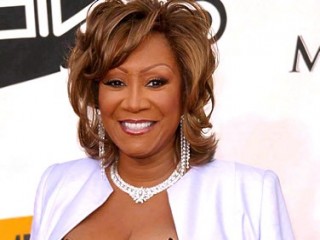
Patti LaBelle biography
Date of birth : 1944-05-24
Date of death : -
Birthplace : Philadelphia, Pennsylvania,U.S.
Nationality : American
Category : Arts and Entertainment
Last modified : 2011-10-17
Credited as : Singer, Lady Marmalade, Lifetime Achievement Award
1 votes so far
LaBelle spent 16 years as lead singer of Patti LaBelle and the Bluebelles, who changed their name to Labelle in the early 1970s and released the disco song, "Lady Marmalade".
A shy girl, Patricia gained confidence through her singing, which she did every Sunday in the choir of Beulah Baptist Church in southwest Philadelphia. As a teenager, she began singing secular music with friend, Cindy Birdsong. The duo formed the Ordettes in 1959 and, a year later, signed on two more friends, Nona Hendryx and Sarah Dash. As the group experienced increasing success, Patricia's parents allowed her to leave high school with her friends in order to go on tour.
The Ordettes, with Patricia as the lead vocalist, signed with Newtown Records in 1961. The company changed the group's name to The Bluebelles, from which Patti took her new stage name, LaBelle, French for "The Beautiful." In their first year at Newtown, they recorded their debut single "I Sold My Heart to the Junkman." The song became an instant gold record and a No. 1 hit.
Going out on the road, the BlueBelles earned national fame at The Apollo Theater in Harlem, New York, where they became "Apollo Sweethearts." The group also enjoyed modest success with remakes of songs such as "You'll Never Walk Alone" and "Somewhere Over the Rainbow," and their ballad "Down the Aisle (The Wedding Song)" became a top 40 hit. Yet nothing compared to their early success. In 1967, Cindy Birdsong left the group to join forces with Diana Ross and the Supremes. Meanwhile, the remaining members of the BlueBelles tried to pull out of their musical slump.
In 1970, unable to recreate their early success, the BlueBelles were dropped from their label and abandoned by their managers. Patti turned to promoter Vicki Wickham for help with their antiquated image. Under Wickham's management, the group changed their name to the edgier "LaBelle," altered their fashion to reflect the 70s glam rock era, and pushed the limits with their lyrics and music. After releasing several albums on the Warner Bros. label, their 1974 release Nightbirds finally caught on with listeners. The first single off the album, "Lady Marmalade," about a seductress in New Orleans, became the group's first No. 1 hit in 12 years.
In response to the album's success, LaBelle began a whirlwind tour, becoming the first group to play at the Metropolitan Opera House, and the first black vocal group to land the cover of Rolling Stone magazine. Yet, underneath the success, there was a layer of tension within the group over musical direction. In 1977, after creative differences, the group split up to focus on solo projects.
Patti LaBelle released her eponymous solo debut in 1977, which received critical acclaim. In 1982, after the moderate success of albums such as Tasty (1978) and Released (1980), LaBelle recorded the ballad "The Best is Yet to Come", which reached No. 14 on the R&B chart, and garnered LaBelle her first solo Grammy Award nomination. That same year she had a No. 1 hit with "On My Own," sung with Michael MacDonald. Throughout the 80s, LaBelle continued to score hits with songs such as 1984's "New Attitude" and "Stir It Up," which both became pop radio staples, as well as 1989's "If You Asked Me To."
In 1991, LaBelle released Burnin', which hit gold status and landed the singer her first Grammy Award. She was honored again for her work in 1993, when she was given a star on the Hollywood Walk of Fame. She also continued releasing popular albums throughout the 90s, including Gems (1994), Flame (1997), and Live! One Night Only (1998)—which won LaBelle her a second Grammy.
In 2008, Patti and former LaBelle members Nona Hendryx and Sarah Dash reunited to release Back to Now, their first full album as a group in 32 years. The collection featured a combination of new songs and singles recorded before the LaBelle break-up. The album was followed by a successful reunion tour. In June of 2009, Patti LaBelle was honored yet again, with her induction into the Apollo Legends Hall of Fame.
On September 14, 2010, LaBelle made a return two decades after her last Broadway performance to star in the award-winning musical Fela! about Afrobeat legend Fela Anikulapo-Kuti. LaBelle replaced Tony Award-nominee Lillias White as Fela's mother, Funmilayo Ransome-Kuti, and remained with the production through the end of its run on January 2, 2011.
On May 23, 2011, LaBelle appeared on "Oprah's Farewell Spectacular, Part 1” the first show in a series of three shows constituting the finale of The Oprah Winfrey Show, singing "Over the Rainbow" with Josh Groban.
LaBelle was honored with the Lifetime Achievement Award at the BET Awards on June 26, 2011.
In addition to her success as a singer, LaBelle has also written two books: the autobiography Don't Block the Blessings (1997), and the diabetic cookbook LaBelle Cuisine: Recipes to Sing About (1998). She has also starred in stage and screen productions, including roles in the films A Soldier's Story (1984) and Beverly Hills Cop (1984); an appearance in the Broadway gospel musical Your Arm's Too Short to Box with God (1982); and a recurring role in the television series A Different World (1990).
Patti LaBelle married her manager, Armstead Edwards, in 1969. The couple split in 2000, after 30 years of marriage.
















